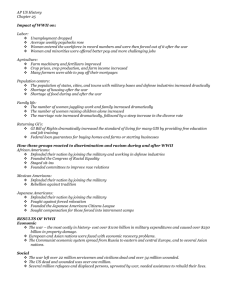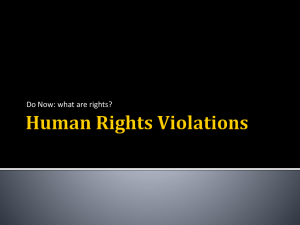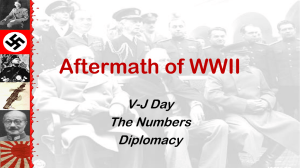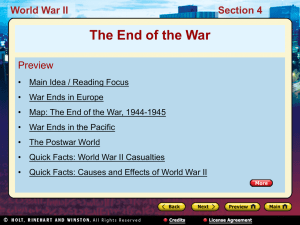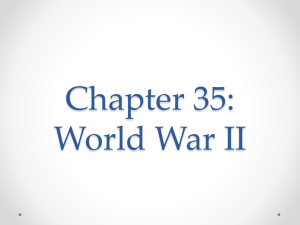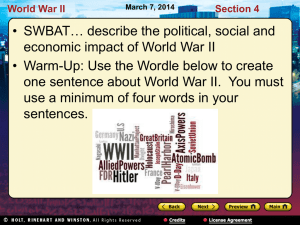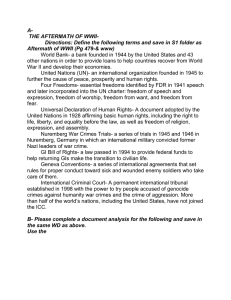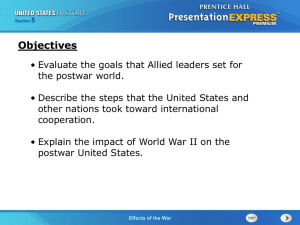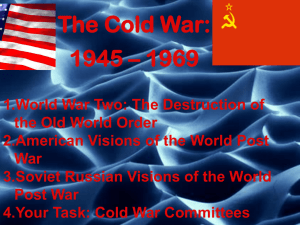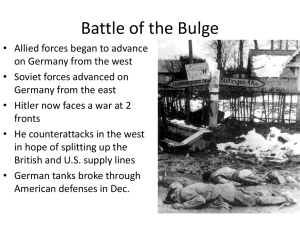The End of World War II And Outcomes
advertisement
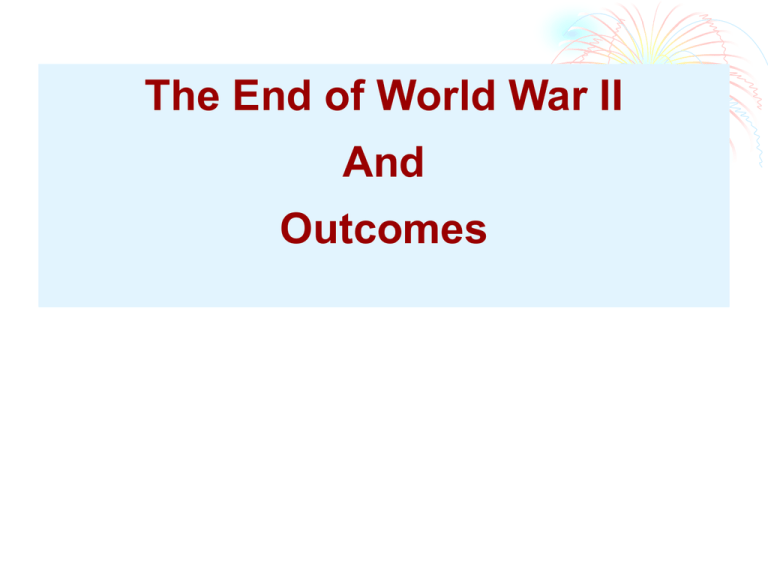
The End of World War II And Outcomes War Ends in Europe • Soviet advance—pushing Hitler’s troops backward • Axis forces with 2 million casualties—outnumbered and outgunned • Early 1944, Siege of Leningrad ends; more victories for Soviets followed • Axis forces driven back into central Europe • Soviets within 40 miles of Berlin by February 1945 D-Day • Second front in Western Europe • Sea assault led by Marshall and Eisenhower • June 6, 1944, invasion at Normandy • Victory came with high casualties • Paris free by end of August Battle of the Bulge • December 1944, one last stand • Counterattack at Belgium • German advance led to bulge in the line • Defeat ended German resistance • Allies racing to Berlin from the east and west The Germans Surrender • Soviets reached Berlin first • Adolf Hitler found dead in bunker—a suicide • Berlin surrendered May 2, 1945; Germany five days later • Victory in Europe (V-E Day) proclaimed May 8, 1945 • War in Europe finally over after nearly six years War Ends in the Pacific Final Battles • By mid-1944, regular bombing raids on Japanese cities, including Tokyo • Great distance made raids difficult, dangerous • Americans needed bases closer to Japan Battle of Iwo Jima • February 1945 island invasion; 750 miles south of Tokyo • 7,000 Americans died in month of fighting; 20,000 Japanese died—only 1,000 thousand surrendered Battle of Okinawa • Only 350 miles from Japan; U.S. troops invaded island April 1945 • By June, 12,000 American soldiers dead • Japanese lost 100,000 defenders and another 100,000 civilians The Atomic Bomb • After Okinawa, mainland Japan was next • The U.S. military estimated cost of invading mainland Japan-up to 1 million Allied killed or wounded Option to invasion July 26, 1945 • Atomic bomb successfully tested in 1945 • Allies issued demand for surrender • No response; Hiroshima bombed on August 6 • Harry S Truman U.S. president with Roosevelt’s death in May 1945 • Forced to make decision—bomb Japanese city to force surrender • Still no surrender; second bomb dropped on Nagasaki on August 9 • 145,000 total deaths • Japanese acknowledged defeat Emperor Hirohito surrendered on August 15, 1945. This day is known as V-J Day for Victory in Japan. World War II was finally over. The Postwar World • End of war, Europe and Asia in ruins • Tens of millions dead; heaviest losses in Eastern Europe • Germany, Japan, and China had also suffered greatly • Physical devastation; cities, villages, and farms destroyed • National economies near collapse • Millions uprooted • former prisoners of war, survivors of concentration camps, refugees of fighting and of national border changes Planning for the Future July 1941 • Allied leaders planned for years for the of war • Churchill and Roosevelt met to discuss even before U.S. entered war Atlantic Charter • Joint declaration of Churchill and Roosevelt • Outlined purpose of war Tehran Conference • December 1943 • Roosevelt, Churchill, and Stalin • Sought no territorial gains • Agreed on schedule for D-Day invasion • All nations could choose their own government • Would work together in peace after the war • Work for mutual prosperity Yalta Conference • Held in Soviet territory in early 1945; Allies on brink of military victory • Primary goal to reach agreement on postwar Europe • Roosevelt, Stalin, and Churchill agreed on plans for Germany • Stalin got his way with Polish territory, made promises United Nations • Roosevelt got Stalin to agree to join fight against Japan once war in Europe over • USSR would join new world organization—United Nations • Meant to encourage international cooperation and prevent war • June 1945 charter signed with five major Allies as Security Council Potsdam Conference July 1945 Three sides • Small German city location for Potsdam Conference • Soviet Union, Britain, and United States • Growing ill will between Soviet Union and other Allies • Discussed many issues but had difficulty reaching agreement Closing months • American and British leaders worried about Stalin’s intentions • Concerned about spread of communism, growth of Soviet influence Stalin • Soon broke his promises • Did not respect democracies in Eastern Europe • Another struggle beginning Marshall Plan Rebuilds Europe • Plan to help rebuild Germany & the rest of Europe • The U.S. hoped that $15 billion in aid would prevent the spread of communism: CONTAINMENT • http://en.wikipedia.org/wiki/Marsh all_Plan Emergence of Two Superpowers • Conflicting beliefs of USA and USSR: capitalism versus communism • Cold War begins Division of Europe • Soviet spheres (east) versus democratic countries (west) • “Iron Curtain” divides the continent, symbolized by Berlin Wall (1960s) • NATO (west) and Warsaw Pact (east) are competing military alliances • http://en.wikipedia.org/wiki/NATO and http://en.wikipedia.org/wiki/Warsa Berlin Wall Nuclear Age Begins The two bombs dropped on Japan resulted in 110,000 instant deaths and 130,000 injuries. • 1st nuclear weapons used on Japan during WWII • USSR develops bomb in 1946 • Arms race continues throughout Cold War • Britain, France, China also Creation of the United Nations • First meeting in San Francisco in 1945 • 51 original members • 192 current members • Goal=solve conflicts peacefully & UN Security Counsel • A smaller body of the UN • 5 permanent members: US, USSR (today Russia), Britain, France, and China • Power to apply sanctions or send peace-keeping forces • Have the power to veto any council decision Nuremberg War Crimes Trials • Nazi officials tried for war crimes • Created accountability for crimes against humanity • Trials were also held in Japan and Italy Creation of the State of Israel • Palestine was a British mandate prior to WWII • Desire for a homeland for Jews from around the world after WWII • Sympathy due to the Holocaust • Two states created in 1948: Jewish state & Arab state • Led to continuing conflict Arab state Jewish state
